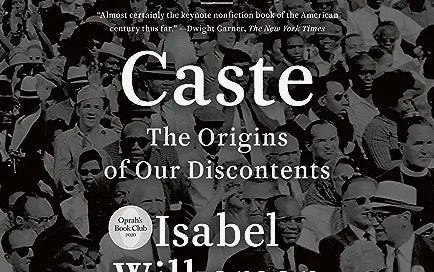BookLife Review by Carol O'Day: Caste: The Origins of our Discontent (Isabel Wilkerson, author)
non-fiction, U.S. history, race relations, racial injustice, Indian caste system, eight pillars of caste, Nazi Germany, political history and philosophy
Caste, by Isabel Wilkerson, is an important read, and a deeply insightful and provocative one. Wilkerson earned the Pulitzer Prize for her work with The New York Times for a profile of a fourth-grader from Chicago’s South Side and for two stories of the Midwestern flood of 1993. She also won the National Book Critics Circle Award for her enormous work, The Warmth of Other Suns: The Epic Story of America’s Great Migration.
With the historical epic of The Warmth of Other Suns securely in her proverbial pocket, and in her rearview mirror, with Caste, Wilkerson tackles the topic of race relations in the United States through a novel and thought-provoking lens. She contends that underlying racial relations and institutional racism in the United States is a complex caste system not unlike those that have governed society in India for centuries. She documents how Nazi Germany studied race relations in the United States to formulate it’s policies on annihilation of the Jews. She argues that beyond race, a caste system is ultimately about power-those who have it and those who do not.
Wilkerson posits eight pillars of a caste system: divine will and the laws of nature; heritability; endogamy and the control of marriage and mating; purity vs. pollution; occupational hierarchy; dehumanization and stigma; terror enforcement and cruelty as a means of control; and inherent superiority versus inherent inferiority. This is a dense list of topics and concepts, yet Wilkerson’s writing renders them accessible. She utilizes historical examples, extensive documented research and personal anecdotal stories to illustrate each of the pillars, forging a compelling case and an even more riveting read.
It is indisputable that the United States has a deep, troubling and shameful history of systemic racism-a founding premised on taking of Native peoples’ lands followed by an economic development history based upon enslavement of African American people. This history has for decades, if not centuries, been viewed through the lens of racial inequality. Wilkerson’s book does not in any way refute these issues. Rather she deepens and supplements our understanding of them with a fresh point of view–in a sense a deeper look at the underpinnings of the histories and behaviors behind the issue of race relations in the United States. Her examination of the concept of caste as a lens for exploring race relations and as a tool for overcoming our roadblocks to progress is eye-opening. As a society we might benefit from this wider lens, by seeing our own practices in a more global view and acknowledging some of the parallels in our history that illuminate our practices. Her ideas resonated with me. Perhaps from such kernels of truth, lasting change can bloom.




